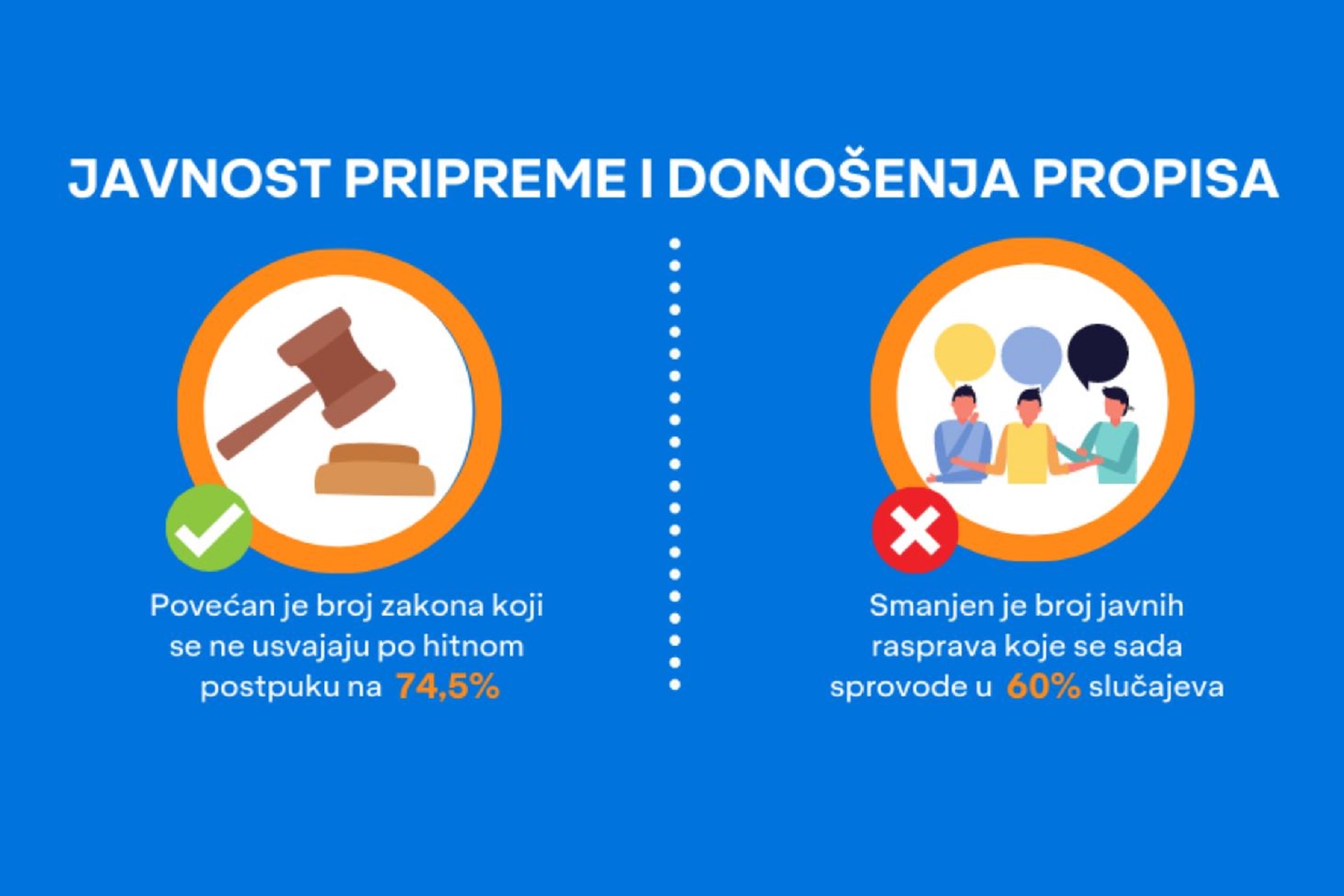The reform process in 2024 will depend on the speed of forming the new Government
Greater efficiency in passing laws, reduction of administrative and financial burden and consistent application of regulations would help create a better business environment, according to data from the latest NALED Regulatory Index of Serbia (RIS), which evaluates the quality of legislative practice in our country with 46 out of 100 points. The partial results, as stated in the report, were influenced by the long technical mandate of the previous Government lasting eight months, which is why it is important that the current election process be carried out efficiently and that the new Government be formed in a shorter period of time.
NALED Managing Board member Goran Kovačević explains that the Government worked without an adopted Plan for the given year, and therefore, 70% fewer laws were passed in 2022 than the previous year. In total, we received 60 laws, 18 of which had an impact on the economy, and only one was completely new and related to social entrepreneurship.
- A high-quality and predictable legislative process is in the interest of both the economy and local governments, which is why NALED initiated the preparation of this report more than a decade ago. Looking at all previous editions of RIS, we see that the adoption of by-laws was and remains the biggest problem of our system. That is why it is important that next year we focus more on the implementation of laws, which will be of little use to us if the by-laws are delayed by a year and a half. On the other hand, we have to praise the fact that the practice of adopting laws by urgent procedure has practically been stopped, and we know how often this happened before - explains Kovačević.
Since the first RIS, the greatest progress has been achieved in the field of transparency and public involvement in the preparation of regulations, and the best result was achieved in 2021, when public hearings and consultations were organized for 95% of laws. Unfortunately, that trend was not maintained last year, because due to the limited work of the Government, there was not enough time for discussion. Public hearings were held for every other law, and drafts were available in two-thirds of the cases.
- This is another indicator of why it is important that there is continuity in the work of regulatory bodies. We will come out with the RIS 2023/24 already in the spring and we expect the upward trend of including the economy and the public in the dialogue to continue, as was the case when the Law on Electronic Communications and the Law on Health Documentation and Records in the field of health were passed - he concludes Kovacevic.
The Regulatory Index also points out that the administrative burden on the economy, i.e. the time invested in the implementation of procedures, as well as all related fees and charges, amounts to 2.95% of GDP. These findings are also confirmed by the economic survey conducted in 2023, in which 92% of businessmen state that the biggest problem of the regulatory environment is the high financial and administrative burden on business.
When it comes to communication between institutions and citizens, it was noted that ministries answer on average slightly more than half of the inquiries they receive, in which they are more regular with easy questions (68% of all inquiries are answered), and are less up-to-date if they need to deliver information of public importance (44%), although they are obliged to do so by law. This year, the sites were rated as clear.
RIS follows the path of law adoption, from the adoption of the Government's Work Plan, through public debates on draft laws, to the effects of the law's implementation on the economy, through six components. In addition to the predictability of the adoption of regulations (fulfilment of the legislative plan and the frequency of amendments and additions to laws) and the up-to-date implementation of laws (the adoption of by-laws), RIS also measures the quality of the preparation of regulations (conducting analyzes of the effects of planned laws), the involvement of the public in that process (public discussions, availability draft and urgency of adoption), regulatory burden (administrative costs of law enforcement) and availability of information on regulations.
Since 2013, when the first RIS was published, 8 reports have been published until today, and the last one was published with the support of the Swedish Agency for International Development and Cooperation (Sida), within the project "Public procurement and good management for greater competitiveness".



